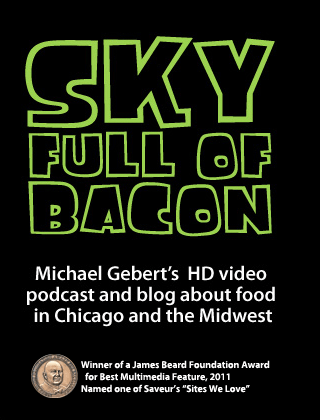
I’ve had a few social occasions with restaurant PR folks lately, and some of the conversation inevitably went in the direction of, what is this media world coming to and how can we all make it work so that it’s mutually beneficial and informative for journalists, restaurants, PR people and diners, rather than frustrating or intrusive or cheesy. (If you wonder why they ask me these questions, I suppose this series is one answer.) Some will, no doubt, ask why it’s the journalist’s job to help the PR industry at all, rather than to maintain an adversarial or at least wary, arm’s length relationship, but when it works well, it opens doors to new possibilities for writers. And when it doesn’t it doesn’t, so I’m all for better PR that works better for everybody, and this is my perspective on that. The following is a made-up conversation, but its pieces pretty much come from reality:
So how do you think restaurant PR can adapt to the era of blogging?
Are we an era? That’s a tough one because in a cost-benefit analysis way, I’m not convinced that any local restaurant blogger has an audience that’s particularly big enough to be worth going after— if that’s how you want to measure things. On the other hand, the PR business routinely spends money on an audience I’d have just as hard a time justifying the ROI on, which is the usual list of attendees for the Thursday night cocktails and nibbles event at such and such restaurant, which doesn’t really get the big names (with a few exceptions) because their organizations have policies against that sort of thing. So spending money on bloggers is not worse than that, but I’m not sure I think it’s any better on a pure audience size/conversion to reservations basis.
But I think that’s the wrong way to look at it anyway— a mass media way which is about getting the biggest raw number possible. That’s not what it’s about now.
So what’s it about now, and how do you justify spending money on it?
What has the PR industry always told its clients that it was getting for them? Buzz. This nebulous thing, which can seem like BS except, when somebody really has it, you see how amazingly it works. In Chicago it means places are packed on day 1 and can stay that way for years. But you’ve never been able to quantify it before, right?
Well, now buzz has corporeal form. You can go on Twitter and some of these food-news blogs and see it in action in real-time. So no one may have a massive raw audience, but some people are simply part of the conversation, they’re closer to the center of all this activity and what they get jazzed up about gets others jazzed up. And if you can target them and get them excited, then it will trickle up. I mean, Chicago didn’t become Weird Pork Parts City because Phil Vettel declared it one day. It became that because chefs got into it, and then there was all this talk going around that random animal parts were cool. That’s what’s so interesting about Twitter, though it’s certainly not the only place this happens, but it’s this incredibly democratic space where buzz moves around between people, not irrespective of status, but pretty damn freely. It should be exciting that there are so many ways to get into that conversation now.
Now you’re saying you’re at the center of the media universe?
Ha! No, thankfully. Actually I had a very interesting encounter at a PR event a while back; I met this woman who was a producer for one of the TV stations. And she told me the big new local talk show she was working on and I told her about Key Ingredient and getting a Beard nomination… and it was obvious that neither one of us had ever heard of the fabulous and very important thing the other one was doing. So no, I don’t think the media universe is waiting each day to see where Sky Full of Bacon says to eat now. The media universe has no center now, it’s decentralized and has all these different spots where stuff is burbling and fermenting— where we’re all legends in our own minds.
So all you have to do is just keep an eye on what each of these dozen or two dozen amorphous groups are buzzing about. Easy!
Oh, yeah, piece of cake. As a blogger, do you like being contacted with our usual pitches, or is it just annoying?
That’s a hard one to answer. I like your pitch if I like your pitch, I make fun of it to my friends if I don’t. (Sorry!) I mean, I understand the issue of resources here— there’s a million of us termite bloggers and you can’t know what’s right up the alley of every single one. At the same time, some of the things people send out— I mean, I got SO MUCH stuff about National Hamburger Month. And I couldn’t help but think, did you look at my blog? Do I look like I’m ever going to get excited that some chain restaurant on the Mag Mile invented a bacon egg and guacamole burger for Cinco de Mayo? I’m going to drop doing a video about biodynamic charcuterie in the inner city and jump right on that, yeah.
So somehow, and I don’t envy you, you have to reconcile the fact that you have to talk to a wide audience and yet, let’s face it, sometimes your client just isn’t doing anything that amazing that bloggers or anybody else is going to get excited by. But still, you can’t write the new media world off because one, the other things don’t necessarily exist any more, and two, you just never know how it will pay off. I mean, three years ago I did a video about generational change at Sun Wah. And this week, the New York Times does a piece about generational change in Chinese restaurants, and out of all the restaurants they could have picked in the whole country, they pick… Sun Wah. Even if they never saw my piece, you know they saw the piece by somebody who saw my piece. That’s how the world works.
What do you wish chefs and restaurants would do better when it comes to dealing with people like you?
You know, the one that amazes me is how little use restaurants and chef sometimes make of what I do. I know they’re all bugging you for publicity but then, when I show up and shoot something about them that makes them look more interesting and thoughtful than the two second soundbite they got on national TV, they don’t even think to tweet it or anything. Honest to God, I think some of them don’t really think it’s actual media because I don’t have twelve stylists and key grips trailing behind me. Well, you don’t need all that stuff any more! I’m the food truck of publicity, I show up, shoot for an hour, and get gone, but seriously, when the Food Network wants to find out about you, what do you think they’re going to look at? The two second soundbite or the clip where I let you talk, intelligently and extemporaneously, for five minutes? They don’t care how big a crew shot it.
So take advantage of it, for cryin’ out loud. And apply that lesson generally. Any time you get so much a mention somewhere, put the word out on it yourself. It helps build your brand, it lets other journalists know you’re a good source, it scratches the journalist’s belly a little to be noticed and thanked, it could lead to the New York Times. Don’t ask for more PR until you’re milking the PR you already get for all it’s worth.
What do you think about what Ellen Malloy’s doing with putting a lot of PR content online for journalists to just pick stuff up from? Is that going to replace traditional PR?
I don’t think things replace other things all that much. It’s more likely that the new thing will grow the market in some new direction while the old one has to evolve to fit a changed environment. But she is doing one of the main things the internet always does, which we called “disintermediation” back in the dot-com days— giving the end user the ability to do it himself instead of having to go through somebody to get it done. In this case, she’s putting a lot of stuff online so journalists can go find story ideas poking around her site for two minutes and throw questions out to a bunch of people instead of spending the whole afternoon making phone calls. I think that’s obviously helpful in a lot of situations. That said, I can’t say I’ve used it much myself, because I don’t do that kind of story— ohmigod Mother’s Day is coming up I need to find out who is doing what for Mother’s Day, fast. That’s a mainstream media need more than it’s mine, but sure, it’s a smart solution that some people will use a lot, and will replace a few 22-year-olds fielding phone calls.
It’s also not the only solution that’s out there waiting to be discovered and built out, either. There’s plenty of room to make this process better.
I suppose it hardly matters, the future belongs to Groupon anyway.
Well, I wouldn’t bet on any billion-dollar-value dotcom even existing in a few years, and Groupon’s lack of repeat business is somewhat worrying (though I don’t think a low return customer rate in itself is tantamount to being a Ponzi scheme). But I have a somewhat different take on Groupon anyway, which is that fundamentally it’s less of a sales promotion service than a media company. Traditional media were, of course, built on the idea that they were the only way to reach a big group of whoever— middle class department and grocery store customers if you were the Trib, counterculture young people who went to concerts if you were the Reader, etc. Then suddenly there was ten times as much content and no clear sense of what anybody was really reading— I could buy ads in a million places aimed at restaurant goers, but what proof did I have that anyone would see them there, that I was reaching the best group in the best place? An explosion of choice paralyzed the market and turned ad rates into a commodity.
So Groupon reinvented the business and nailed down all the loose pieces of the traditional media model. Not sure if anybody actually reads this stuff? We know exactly how many get our deals and how many buy, and no ad agency is going to have to give you a BS presentation about your front of mind awareness going up 7%, when your cash register is stuffed full of the things. Don’t want to pay money up front? You don’t have to pay a cent up front, you’ll just pay out the nose on the back end, Groupon turned the 15% commission on media buys into the 75% on actual results one. The clue is how much emphasis Groupon puts on writing fun copy— they’re entertaining their audience just like any other media company, not merely selling like the deal of the week offers that preceded them. Now, I question its long-term sustainability for various reasons, but it’s definitely one of the models to look at to see where the world is going— if the mass media audience is fragmented, build your own and sell it.


 If you like this post and would like to receive updates from this blog, please subscribe our feed.
If you like this post and would like to receive updates from this blog, please subscribe our feed.




